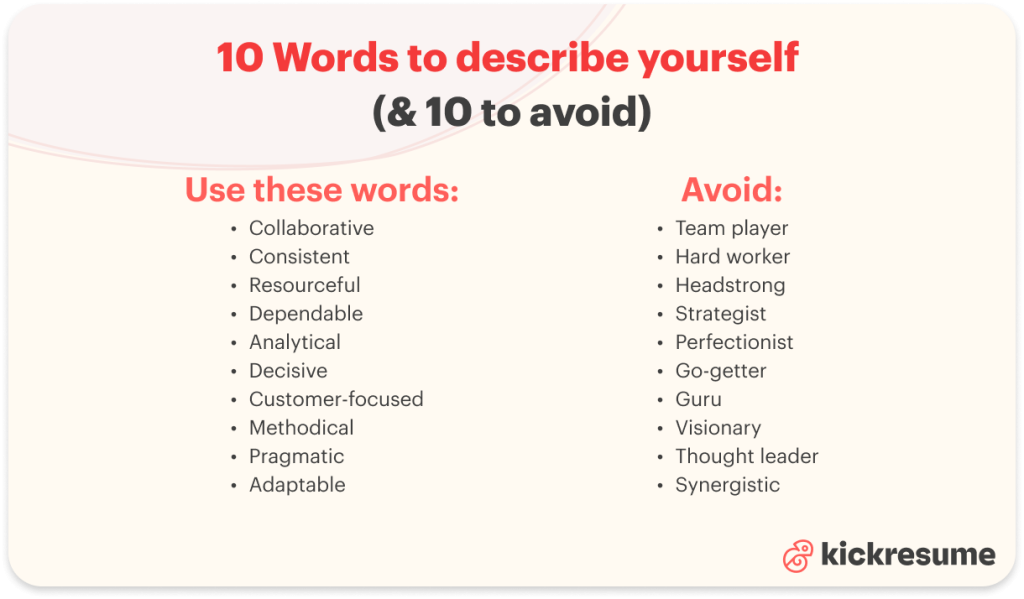Choosing the right words to describe yourself can make all the difference in landing your dream job.
Whether it’s on your resume, in a cover letter, or during a job interview, how you present yourself can set you apart from other candidates.
And, as everybody knows, words matter. Especially in a work environment!
But not all words are created equal! Some can make you seem more dynamic and capable, while others might come across as vague or clichéd.
So, which words are your best bet when you want to impress future employers?
Keep reading this article and learn:
- How to pick the right words;
- 20 words to describe yourself in a job interview;
- 20 words to describe yourself in a cover letter;
- 20 more words for your resume;
- And, which words you should avoid.
- How to choose the right words to describe yourself
- Words to describe yourself in a resume
- Words to describe yourself in a cover letter
- Words to describe yourself in a job interview
- Words to AVOID when describing yourself
- Key takeaways: Words to describe yourself (in a resume, a job interview, or a cover letter)
How to choose the right words to describe yourself
Before we show you any lists or examples, we need to explore the million dollar question: “How do I know which words to use when describing myself?”.
Instead of just spitting out random words and hoping that at least some of them hit the mark, take a more strategic and focused approach.
Here’s a simple step-by-step guide on how to identify the right words to describe yourself and impress even the most demanding of recruiters:
- Understand the job requirements.
Firstly, start by re-reading the job posting you're responding to. Pay close attention to the key skills and qualities the employer is looking for. For example, if the job posting calls for “adaptability” and “competitiveness”, adjectives like “adaptable” and “competitive” might be just the words recruiters want to hear.
- Research the job position.
In case the job posting isn't particularly generous with information, don't hesitate to look for answers elsewhere. For instance, you can skim through job listings regarding the same position but issued by different companies. Or look at the current trends relevant for your profession.
- Reflect on your strong suits.
Thirdly, you need to take a good look at yourself and take account of your strengths. What qualities set you apart? Do you possess any unique traits? Or, which aspects of your personality can be valuable in the workplace?
- Ask others how they would describe you.
When in doubt, ask a friend — or even better, a colleague! Because a set of objective eyes can sometimes see things that would otherwise stay hidden to us. And who knows you better as a professional than your coworkers?
- Make a list.
Finally, write down all the words that came to your mind while completing the previous steps. The goal here is to generate as many ideas as possible, so don't limit yourself. This list will serve as a foundation from which you can then select the most appropriate words.
Words to describe yourself in a resume
As you probably know at this point, a resume is the main document that makes up your job application.
When talking about resumes, the first things that come to mind would probably be the work experience section and the skills section. And each of these is crucial in their own right!
But we want to draw your attention to a completely different section of your resume — the topmost part, to be precise. Because that's where your resume summary would be situated.
A resume summary is a short text (usually 2-5 sentences) that serves at the highlight of your best qualities and achievements. Since its purpose is to persuade the hiring manager to keep reading your resume, it's the best place to sneak in those powerful adjectives.
Here are 3 examples of what a good resume summary can look like:
#1 Resume summary example
#2 Resume summary example
#3 Resume summary example
And now, here's a list of 20 words to describe yourself on a resume:
- Collaborative
- Efficient
- Thorough
- Competitive
- Resourceful
- Versitile
- Persuasive
- Dependable
- Analytical
- Decisive
- Customer-focused
- Strategic-minded
- Data-driven
- Experienced
- Persistent
- Conscientious
- Punctual
- Responsible
- Diligent
- Attentive
To see how a great resume summary works in practice, check out this sample that's been submitted by a real person who managed to secure a job thanks to our sleek resume templates.
Like what you see? Your resume can look just like this! Click on the red button and adjust this sample to your liking.
Words to describe yourself in a cover letter
Your cover letter is yet another opportunity to showcase that you're the right person for the job.
But when it comes to the placement of descriptive phrases and adjectives, a cover letter offers you more space to work with. And that's what makes it the ideal place to demonstrate your personality as well as professional attributes.
To make these words more impactful, we recommend putting them into a specific context. Firstly, you can mention your chosen word. And, secondly, follow it by a concrete example from your previous employment. Simple!
And of course, you can also support your achievements by including quantifiable data whenever possible. This is the surest way to turn empty phrases into poignant evidence of your expertise.
For your inspiration, here are 4 examples of words to describe yourself used in cover letters:
How to describe yourself in a cover letter examples
And, of course, here are 20 more words to describe yourself in a cover letter. Boom!
- Ambitious
- Industrious
- Pragmatic
- Investigative
- Committed
- Disciplined
- Tenacious
- Adaptable
- Imaginative
- Perceptive
- Self-reliant
- Proactive
- Shrewd
- Consistent
- Adept
- Methodical
- Vigilant
- Reflective
- Empowering
- Communicative
And how could we forget! Here's a cover letter sample to show your exactly how it's done:
For more cover letter samples, you can just search through our cover letter database. Who knows, maybe you'll find your inspiration there.
Words to describe yourself in a job interview
Imagine you're at a job interview, and one of the questions is: “If you had to describe yourself in three words, what would they be?”
Well, here's your 'words to describe yourself in a job interview' cheat sheet:
- Persevering
- Proficient
- Systematic
- Productive
- Curious
- Engaging
- Confident
- Respectful
- Bilingual
- Independant
- Diplomatic
- Protective
- Candid
- Constructive
- Objective
- Eclectic
- Insightful
- Open-minded
- Impartial
- Cool-headed
Pro tip: Don't just list three adjectives and be done with it! Instead, you should take this opportunity in your stride and talk about professional situations when you've capitalized on these qualities.
For example, your answer could look something like this:
#1 How to describe yourself during a job interview example
Or like this:
#2 How to describe yourself during a job interview example
Besides that, you should also probably prepare for all the other classic interview questions like:
Words to AVOID when describing yourself
Now that we've given you plenty of examples you can use during your job hunt, we're still not finished!
In fact, we're about to give you a friendly warning!
There isn't any magic crystal ball that could tell you exactly which words will make the employer want to hire you. But there are certain words that will guarantee you a well-deserved eye roll.
So, when you're describing your qualities, try to avoid the following:
- Clichés. Do you know what recruiters hear when you tell them that you're a “team player” or “hard worker”? Absolutely nothing! Because of how overused they are, these words actually lost all their meaning. Instead, opt for more precise language that provides a clearer picture of your abilities.
- Vague phrases. What exactly does it mean to be a “strategist” or that you're “motivated”? Remember to always provide a specific context to expressions like these. Otherwise your self-description might come across as too generic.
- Words that carry negative connotations. Finally, steer clear of double-edged expressions. For example, does “headstrong” mean determined or stubborn to the point of no return? Or, when you say that you're “assertive,” are you implying you're a passive-aggressive jerk?
To give you a less vague idea (wink wink) of which words to avoid when describing yourself at all costs, here's a short list of examples and the potential red flags they carry:
- Passionate. This expression is far too common and doesn't really provide any specific value.
- Strategic. Again, without a specific context this is just another empty can.
- Perfectionist. Although well-meant, it can imply that you're inflexible.
- I'm a go-getter. OK Karen, calm down.
- Guru. Tell me you're delulu without telling me you're delulu.
- Visionary. Hi, I'm Pete and my favorite hobby is ego tripping.
- Thought leader. The heck does this even mean? Do you have a cult? Or worse, a podcast?
- Synergistic. LOL

Key takeaways: Words to describe yourself (in a resume, a job interview, or a cover letter)
Knowing the right words to describe yourself can mean the difference between standing out or blending in.
Plus, the words you choose can make a lasting impression on potential employers and colleagues. Use specific, impactful words to show that you understand your strengths and can articulate them effectively.
Some of the most effective words you can use to describe your professional qualities include:
- Collaborative
- Thorough
- Resourceful
- Dependable
- Analytical
- Decisive
- Customer-focused
- Punctual
- Pragmatic
- Adaptable
- Consistent





